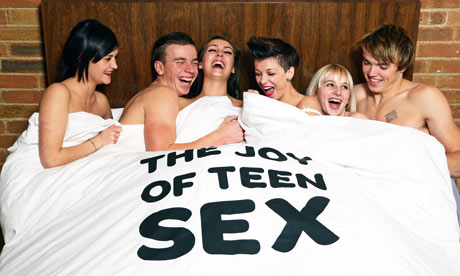
Channel 4 is facing criticism over its series The Joy of Teen Sex, with a group of health and education professionals calling on the broadcaster to set up an advisory group to inform future programming.
In a letter delivered to Channel 4 on Wednesday, signatories including Dr Stuart Flanagan, who features on Radio 1's Sunday Surgery, and sex researcher and agony aunt Dr Petra Boynton, claim the broadcaster and the programme's producers have not acted responsibly or fulfilled their public service remit.
The Joy of Teen Sex, which began on 19 January and concludes tonight, deals with teenagers' "real" sex and sexual health problems, according to Channel 4.
However, the letter, signed by 23 health and education professionals and bodies, describes the series as "fitting a pattern of programme development where viewing figures are prioritised over empowerment but where programmes are still marketed as 'educational'".
In response to the criticism, Channel 4 issued a statement saying it was "proud of our programming in this field" and its "ability to bring large audiences to the often difficult issues they have addressed".
"We have a hugely successful Sexperience website which has been consistently a leader in the field and has seen millions log on for further advice or information after watching the programmes. Anecdotally we also know from healthcare professionals that viewers have sought medical advice and treatment as a result of watching the programme," the broadcaster added.
The letter to Channel 4 expresses the group's unease about several key issues, including what they claim is the lack of qualified professionals on the show, poor advice, and inaccurate and misleading information.
They suggest that one way to rectify some of the damage caused by the series would be to establish an advisory group comprising sexual and reproductive health practitioners, sex education workers, youth workers, parents and young people to ensure that future programming on this theme will be empowering and accurate as well as entertaining.
Some of the experts first registered their concern over the show when they were approached for their input when it was in its planning stage. Justin Hancock, of sex education website BishUK, said: "I'm always concerned that primetime shows about young people are exploitative and invite viewers to be critical of young people. Sex and relationships for young people is complex and nuanced and factual entertainment shows only ever really scratch the surface of what is going on for young people."
Pre-production, Hancock was assured by production company Betty that "our aim is to make a thought-provoking and positive series that will look at relationships, emotions and identity as well as 'the act of sex'".
The show has not lived up to those standards, according to Boynton, who was invited to apply for a presenter position on the programme.
"It has not represented the main worries young people have, nor talked about core issues of communication, respect or affection," she said. "Given how the public have questions and concerns about sex and the media is a great place to share relationships information, I feel this was a shocking let down to young people and parents. The public deserve better."
Channel 4 said that production company Betty had consulted "with a number of sexual healthcare professionals to ensure the information provided was accurate and appropriate", but added "we realise that this type of programming will not always appeal to everyone".
"Channel 4 is always willing to listen to the concerns of viewers and interested parties following its broadcasts and we will correspond with the authors of the letter directly about their concerns," the broadcaster said.
• To contact the MediaGuardian news desk email editor@mediatheguardian.com or phone 020 3353 3857. For all other inquiries please call the main Guardian switchboard on 020 3353 2000.
• If you are writing a comment for publication, please mark clearly "for publication".

